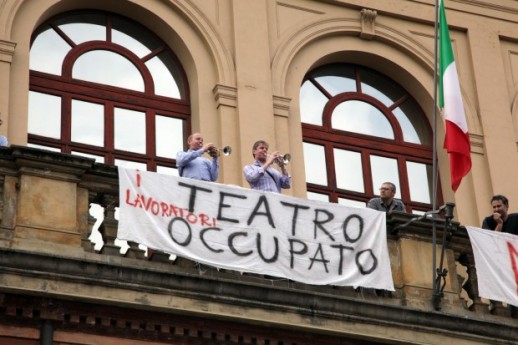
Our Own Ercole Farnese reviewed yesterday’s news reports about this crisis in Italian cultural life. His summaries follow the jump.
The blog Il Fazioso offers details about the situation the “decreto” is meant to address:
The Government each year distributes 260 million euros to the 14 Fondazioni existing in Italy, to which is added 110 million coming from Regioni (regions), Province (provinces) and Comuni (townships). Nevertheless, opera companies lose about 2.7 million euros each year, and they have a cumulative debt of almost 300 millions. The 5,600 workers (who have open-ended contracts) cost about 340 million euros, accounting for about 70% of the total expense.
Opera costs Italian citizens almost 400 million euros and produces about 3,000 performance each year. That means that each performance is subsidized an average of 135,000 euros, which the Treasury finances without security. The Enti Lirici have very limited programs and poor results. They are the least productive in the world: La Scala gives about 100 performances each year, all the others produce half of that.
The decree will pressure orchestra members and employees who to renounce their “monster bonuses” and to negotiate contracts on a national level; it intervenes temporarily blocking turnover and introducing new parameters to hire new members. It intervenes especially on the allocations (disbursements) from the Government, introducing a selective criterion based on quality. Previously, whoever spent more money on personnel, received the most money. Henceforth, the most financially “virtuous” companies will have larger financing and autonomy.
Il Giornale, a right wing daily owned by Silvio Berlusconi — and therefore not very sympathetic to the cause of the workers of the Enti Lirici — speaks favorably of the ministerial decree (which President Napolitano made operative with his signature) that re-organizes the structure of the Enti Lirici, lowering the salaries of orchestra, chorus and ballet members and every type of laborer (stage hands, electrician, cleaning staff etc).
The decree minimizes as well certain supplementary allowances, which Il Giornale mockingly lists: the “al fresco humidity indemnity”, which guarantees orchestra members more money when performing outside. At the Arena di Verona the extras do not go on stage if they do not receive the ” fake weapons allowance (or bonus), if they are not assured that the weapons are actually fake, or the “tailcoat bonus” when they must perform in formal dress. At the San Carlo in Naples there is the “language bonus”: chorus members receive extra money if they must perform in a foreign language. If there is even one foreign word in the score, they are entitled to the bonus.
Under the new decree ballet members will have to retire at 45 (now they do it at 52).
Florence canceled the second performance of Die Frau Ohne Schatten conducted by Mehta; Torino canceled Il barbiere di Siviglia, and Bologna will cancel the prima of Carmen this week.
Last week, workers at the Teatro Comunale in Bologna occupied the theater and Marco Tutino, the Sovrintendente (General Manager) called the police, who evacuated the workers, leaving one of them trapped inside the theater. She is now suing them for kidnapping.
PREVIOUSLY: The President of the Republic of Italy, Giorgio Napolitano, has signed into law a measure to privatize all of Italy’s major opera houses and reduce salaries at these theaters across the board. According to La Repubblica, performances are canceled at theaters throughout Italy and artists and staff from the 15 enti lirici have taken to the streets in protest.
Massive demonstrations are reported in Torino; in Milano carabinieri reportedly attacked orchestra players protesting outside La Scala; and in Firenze, Zubin Mehta led protesters in a performance of “Va pensiero.”
httpv://www.youtube.com/watch?v=tKCsKqXapLg



